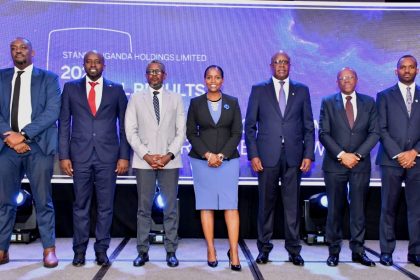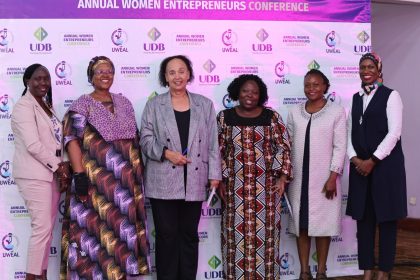Xente sees competitive growth in African digital take-up
 African businesses need to join the digital economy.
African businesses need to join the digital economy.
At the beginning of this year, the African Continental Free Trade Area (AcFTA) came into effect with the main goal of eliminating the obstacles that hinder trade and business between member countries.
Small, but agile firms like Xente Uganda are ready to jump in as enablers. Xente is a financial technology (fintech) company; one of an increasing number dotted all over Africa taking advantage of advances in digital technology.
Digital payments are seen as a vital component of cross-border commerce in the years to come where the merchant and customer agree to accept a virtual payment for the purchases of goods or services.
Fintechs are going to play a significant role towards making AcFTA work for the simple reason that digital transactions are more seamless and free up precious time. This in turn means more trade and business opportunities.
About the time the idea for ACFTA was being debated, people like Allan Rwakatungu, founder of Xente Uganda were already thinking practically along the same lines. “I realized that in order for us to be more competitive, our businesses needed to join the digital economy in order to have a playing field equal to what our counterparts have in the west. If we remain in our small little dukas (small shops) accepting cash, there is no way we are going to be competitive on the global scale.”
To test the waters in 2012, he started a digital sports entertainment platform before launching xente four years later. Essentially, xente is a payments, financial services and e-commerce app for consumers and businesses. It allows businesses to automate payments. “I am not going to say it’s like a bank account. It’s a digital account. We offer corporate accounts and digital payment solutions for businesses.”
Although currently only operating in Uganda, Rwakatungu says they have plans to expand to other markets, “We have a vision at xente, I believe so much in this vision to bring all African businesses into the global digital economy. Every day when we wake up, we take small steps towards that vision, but there is still a lot of work to do.”
He concedes that it may sound like a cliché, but Xente’s future growth depends on their customers and the reliability of services. “Our major asset is the customers. What are the major problems that they have and what solutions we are able to offer them. I always focus the team on that. Our mission at xente is to deliver happiness to our customers. We wake up every day to deliver value to them, correctly and with integrity to ensure their data is safe, make sure their money is safe and that the transactions are fast. By doing so, this helps to safeguard our platform and ultimately our business,” he said.
The other important factor that affects the business is regulation. Last year, the National Payments Systems Act 2020 became law and introduced some challenges for local fintechs. They now fall directly under the oversight of Bank of Uganda, the financial regulator.
Rwakatungu said, “Regulation is the trickiest thing to scale. We have a risk management strategy in place and this is one of the reasons why we welcome regulation. It might be difficult but we welcome it because it provides you with a framework under which to operate. Regulation also helps you safeguard your customers’ interests, their data and information and their money.”
He said, “However the most immediate impact of the National Payment Systems Act 2020 is that it has slowed down product launch. Now you have to do a lot of compliance stuff. You don’t just come up with a product then send it off to the market. Now you have to satisfy the central bank. Compliance is a lot of paperwork that needs to be done and most of it is manual. The manual requirements needed to comply also mean that you have to put capital aside that you cannot touch.”
He agreed to a certain extent that the new regulatory environment may inhibit fintech development in Uganda, but added, “They have left the sandbox out there. So if you want try out something very quickly in the market, the sandbox is an open for that.”
In brief, the sandbox provision allows fintechs to test new applications live but without endangering the overall system in place.
Through the Financial Technologies Service Providers Association (FITSPA) in Uganda which was founded in 2017, Rwakatungu and his colleagues expressed their views and concerns in the drafting of the new national payments law. Perhaps not all their contributions met acceptance but he said, “FITSPA allows us to come together as an industry and advance our common objectives. We work together including the regulator, partners and corporates to develop our financial system as whole,’ he said.
Allan Rwakatungu is not afraid to dream big. “Digital is Africa’s opportunity to leap frog into the future. Just like we leapfrogged from no phones to mobile phones, we can utilize digital from almost no finance to the most modern finance infrastructure platforms, products the world has ever seen. We should take this opportunity and run with it.”

 Trading leads as main source of income for Ugandans
Trading leads as main source of income for Ugandans
 New leadership for bankers’ umbrella as total assets top $12 billion
New leadership for bankers’ umbrella as total assets top $12 billion
 Big fish in small pond Stanbic notches up $100m profit for 2023 topping previous figure by 15%
Big fish in small pond Stanbic notches up $100m profit for 2023 topping previous figure by 15%
 Inaugural event sets agenda for supporting women-owned businesses
Inaugural event sets agenda for supporting women-owned businesses
 Standard Bank Group reports $2 billion earnings up 27% from 2022
Standard Bank Group reports $2 billion earnings up 27% from 2022
 Stanbic Bank Uganda Chief Executive elevated to regional role in Nairobi
Stanbic Bank Uganda Chief Executive elevated to regional role in Nairobi
